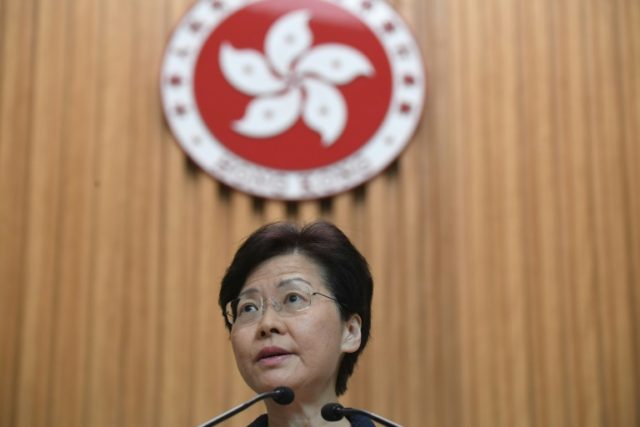Hong Kong’s pro-Beijing chief executive Carrie Lam spun this weekend’s titanic peaceful protest as a victory for her administration on Monday, claiming the lack of violence was a sign the city is “returning to peace” and vaguely offering a “platform for dialogue with people from all walks of life” to find “a way out” of the crisis.
“I sincerely hope that this was the beginning of society returning to peace and staying away from violence,” said Lam.
“We will immediately start the work to establish a platform for dialogue. This dialogue, I hope, will be based on a mutual understanding and respect and find a way out for today’s Hong Kong,” she continued.
Lam repeated her assertion that the extradition bill which kicked off the protests is “dead” and “there is no plan to revive it.” The protesters are unsatisfied with this promise and want the bill to be formally and irrevocably withdrawn.
The protest movement also demands leniency for arrested demonstrators, an official declaration they were not “rioting,” a serious inquiry into the excessive use of police force against them, and sweeping political reforms that would bring true representative democracy to the city. The latter demand is frequently accompanied by calls for Lam to step down so a new chief executive can be elected democratically.
Lam said the investigation of violence currently pursued by police watchdog agencies will have to suffice, leaving some activists to wonder exactly what sort of “dialogue” she is proposing.
Her ostensibly conciliatory speech on Tuesday did not actually address any of the protesters’ five key demands. Lam appeared condescending to the protest movement by blaming it for previous violence and congratulating it for managing to remain peaceful over the weekend. She warned that Hong Kong could be teetering on the edge of a recession and blamed the protests for damaging the city’s economy.
The Wall Street Journal disapproved of Lam’s tone and suggested a humble apology might be in order as a conversation-starter with the protest movement. The UK Guardian found her offering little more to protesters than a slightly more vigorous investigation of the police, noting her promises still came up short of the fully independent third-party review desired by activists.
“Her promises have fallen through every time. If she says the bill is dead then why can’t she just officially withdraw it? You don’t need further communications to do that,” Jimmy Sham of the opposition Civil Human Rights Front complained to the Guardian.
“If her offer of communications is just a means to reach her goal then it’s just a trap,” he warned. “Hong Kong people are not as stupid as she thinks.”
The South China Morning Post (SCMP) expected protesters to accuse Lam of “again turning a deaf ear to their demands” and noted there is a ticking clock on the crisis because Beijing will want things wrapped up before the 70th anniversary of the founding of the People’s Republic of China in October.
“Worryingly, there has been another call to paralyse operations at the airport on Sunday by blocking traffic,” the SCMP observed. “Concern has also been raised by plans to form human chains on pavements along the routes of three MTR [railroad] lines. They will mark the 30th anniversary of the Baltic Way, when the people of Estonia, Latvia and Lithuania formed a chain in their push for independence from the then Soviet Union. Given Beijing’s firm position on sovereignty, such a move inevitably strikes a raw nerve.”

COMMENTS
Please let us know if you're having issues with commenting.